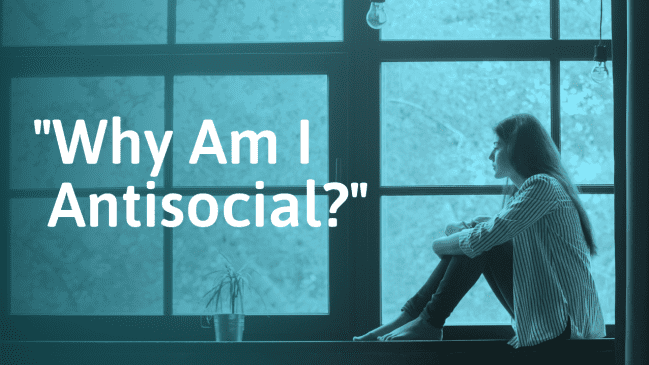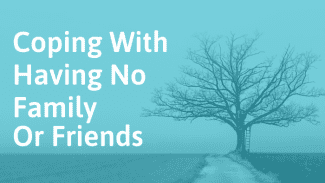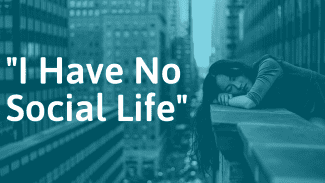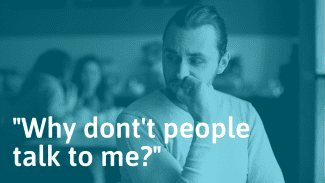“Why am I so antisocial? I almost always prefer to be alone and never desire to seek out people. I’ve been even less interested in socializing lately. Is it OK to be antisocial or is it bad?”
– Riley
It’s common to feel like Riley. In this article, I’ll cover several reasons for feeling antisocial, and what to do about them.
Why am I antisocial?
Actual antisocial personality disorder might be a result of traumatic childhood experiences. However, feeling antisocial as in not enjoying socializing can be a result of depression or social anxiety, bad past social experiences, too little social exposure, or a fearful-avoidant attachment style.
Is it bad to be antisocial?
All people have different social needs. If you enjoy spending more time by yourself, that’s completely fine. But sometimes, there are underlying reasons for feeling antisocial. Perhaps there’s something holding you back from meeting with people, and that could make you feel lonely. This type of antisocial can be bad for you, as it keeps you from doing something you actually want.
What’s the difference between asocial and antisocial?
An asocial person is indifferent about socializing. They don’t dislike it – they just don’t care.
To most of us, being antisocial means that we don’t want to socialize. To psychologists, antisocial has a different meaning and is related to sociopathy (Antisocial Personality Disorder). An antisocial person as a medical term is someone who has a disregard for others.
In this article, we’re focusing on the popular meaning of the word: not feeling like socializing.
“I’ve suddenly become more antisocial”
“Why am I suddenly so antisocial? I didn’t use to be like this”
There can be several reasons for suddenly not feeling like meeting people:
- Going through a stressful period.
- Suffering from depression or other types of mental illness.
- Having had a bad experience socializing.
- Going through a personal change and no longer feeling a connection to existing friends.
Some factors, you might be able to change (such as changing your work situations to be less stressful, or seeking out more like-minded people, for example).
For other underlying issues, such as depression, it can be helpful to see a therapist.
Below, we’ll cover several reasons for why you might be antisocial. Also, see our guide on how to not be antisocial. It contains practical tips on how to overcome feeling antisocial.
Chapter 1: Reasons for being antisocial
Chapter 2: Being antisocial in certain situations
1. Are you afraid of rejection?
According to the social-physical pain overlap theory, rejection can cause physical pain. So if you’ve been rejected in the past, it makes sense that you’d rather avoid it in the future by staying away from social situations.[1]
Try to reframe rejection as one step closer to finding compatible friends. If someone can’t or doesn’t appreciate your personality, it doesn’t mean there’s anything “wrong” with you; it’s a sign you need to look elsewhere for connections. If you are consistently rejected, you may need to work on your people skills, such as body language, small talk, and inviting people to hang out.
2. Were you bullied as a child or teenager?
Research shows that people who were bullied as children tend to have problems making and keeping friends as adults.[2] If you were bullied, you may be hypervigilant to possible threats and have trouble trusting other people. Some victims blame themselves and believe that if they had been a better person, they would not have been abused. Letting go of this shame can be difficult.
Journaling, creating artwork, and talking to peer support listeners can help you express difficult feelings. You could also try to forgive your bully through mindfulness practices such as loving-kindness meditation. If self-help doesn’t work, consider seeing a therapist who can teach you techniques for managing your feelings.
We recommend BetterHelp for online therapy, since they offer unlimited messaging and a weekly session, and are cheaper than going to a therapist's office.
Their plans start at $64 per week. If you use this link, you get 20% off your first month at BetterHelp + a $50 coupon valid for any SocialSelf course: Click here to learn more about BetterHelp.
(To receive your $50 SocialSelf coupon, sign up with our link. Then, email BetterHelp’s order confirmation to us to receive your personal code. You can use this code for any of our courses.)
3. Do you feel self-conscious about your looks?
If you feel unattractive, you may avoid social situations.[3] If you are so self-conscious that you prefer not to leave the house, you could have body dysmorphic disorder (BDD), which is linked with social avoidance.[4]
Body positivity is wonderful, but loving your looks might be an overly ambitious goal right now. Strive for body neutrality instead. Challenge yourself to look in the mirror for several minutes each day until you feel OK with your reflection.
Cut back on your social media consumption. It can make you feel worse about your appearance, particularly if you compare yourself to people you think are more attractive.[5]
4. Do you feel like people have little to offer?
Cynics assume, and look for, the worst in people and situations.[6] Because they don’t trust other peoples’ motives, cynics may write them off too quickly. As a result, they may become isolated and lonely.
Grow your faith in humanity by seeking out stories of inspiring people.
Try volunteering; you’ll probably meet people who genuinely care about important causes. Challenge yourself to notice the positive traits in others, and take a moment to feel grateful when someone helps you out.
When you make a generalization like “Everyone sucks,” stop and think: Is the thought always and absolutely true? Can you think of any evidence to disprove it?
5. Are you depressed?
Social withdrawal is a common symptom of depression.[7] Other signs include a loss of pleasure in activities you used to enjoy, tearfulness, unexplained aches and pains, inappropriate feelings of guilt, low self-esteem, and feeling intolerant of others.
Talk to your doctor if you think you may be depressed. Psychotherapy, particularly cognitive-behavioral therapy, can be helpful. You can find a therapist via the GoodTherapy directory. Your doctor may prescribe you a course of antidepressants. Other lifestyle changes, such as regular exercise and eating a more nutritious diet, can also help you feel better.
We recommend BetterHelp for online therapy, since they offer unlimited messaging and a weekly session, and are cheaper than going to a therapist's office.
Their plans start at $64 per week. If you use this link, you get 20% off your first month at BetterHelp + a $50 coupon valid for any SocialSelf course: Click here to learn more about BetterHelp.
(To receive your $50 SocialSelf coupon, sign up with our link. Then, email BetterHelp’s order confirmation to us to receive your personal code. You can use this code for any of our courses.)
6. Do you feel like you have nothing to say?
If you become comfortable with making small talk, you’re less likely to run out of things to say, even if you don’t have many interests.
Practice talking with people you already see on a day to day basis, such as colleagues and neighbors. Remarking on the weather, your surroundings, current affairs, and whatever is going on in your local area is usually enough to start a conversation. If you run out of things to say, ask questions. Most people are happy to talk about themselves.
Here’s our guide on how to start a conversation.
7. Do you spend too much of your life online?
Internet addiction is a growing problem that affects around 2% of the adult population.[8]
Excessive internet use can lead to social isolation. Online communication is less demanding than face-to-face conversations,[9] making it a tempting alternative to in-person interaction.
Unfortunately, relying on the internet could actually make you feel more lonely, especially if you are a heavy social media user. Use the internet to supplement, not replace, an offline social life. Instead of messaging friends and family, try asking them to hang out in person.
If you suspect you have an internet addiction, try using an app that limits your use like YourHour.
Here’s our guide if you feel like you’re losing your social skills.
8. Are you burning out at work?
Burnout has multiple components: detachment and cynicism, emotional and physical exhaustion, and feelings of inefficacy.[10] The effects can spill over into your personal life, leaving you unable or unwilling to socialize. Burned out people are often irritable, apathetic, and not much fun to be around. Because burnout can develop slowly, you may not realize it’s happening until you are completely unable to cope.
Tell your supervisor or mentor if you’re feeling burned out. Together, you can work out short and long-term coping strategies. For example, you might need to take a week off to rest your mind and body, and then reassess your workload and working patterns when you get back.
9. Do you have social anxiety disorder (SAD)?
Social anxiety disorder (SAD) affects 6.8% of the U.S. population.[11] The main symptom is an overwhelming fear of social situations that goes far beyond typical shyness. If you have SAD, you might feel very anxious about everyday activities involving contact with others, such as making phone calls or eating in public. You may feel worried that others are going to judge you, have panic attacks in social situations, and might withdraw from social activities entirely.
The most effective treatment for SAD is cognitive-behavioral therapy (CBT). Ask your doctor to refer you to a therapist or find one using BetterHelp.
See our article on how to make friends when you have social anxiety.
10. Do you have an avoidant attachment style?
The interactions we have with our parents as babies shape the way we form attachments to others later in life. If your parents did not consistently meet your emotional needs, you might have learned that relationships are difficult and that other people cannot be trusted. As a result, you may have developed an avoidant attitude towards other people.
Some avoidant people may decide that relationships are too difficult, even if a part of them would love close friends or a romantic partner. Changing your attachment style is possible, but it usually requires psychotherapy and a willingness to experiment with new ways of relating to other people.[12]
More about having a fearful-avoidant attachment style on Healthline.
11. Are you undergoing a transition?
A major transition, such as graduating college or becoming a parent, can leave you feeling too tired or overwhelmed to socialize. You may also feel as though you’ve left old friends or relatives behind as you enter a new stage of life.
Meeting people in a similar situation can help; you’ll be able to bond over your shared experiences and offer emotional and practical support. For example, if you are a new parent and have no sources of social support, you could try finding a local parenting group on Meetup.com or ask your healthcare provider for recommendations.
12. Are you a highly sensitive person (HSP)?
Highly Sensitive People (HSPs) are empathetic, easily stimulated, and readily affected by emotions—both their own and those of others. Most are introverts who require regular time alone to recharge.[13] HSPs are also very attuned to the subtleties in their environment, and this can make socializing, especially in noisy or busy places, overwhelming. You can take a quick online test to see whether you are an HSP.
Being an HSP isn’t a character flaw; it’s a trait found in 15-20% of the population.[14]
To learn more about sensitivity and how to improve your social skills as an HSP, check out “The Highly Sensitive Person” and other titles by Elaine N. Aron.
13. Do you prefer to daydream?
We all daydream, but some people spend so much time in a fantasy world that they rarely interact with real human beings.[15] This is called maladaptive daydreaming (MD), and it is linked with social anxiety and experience of childhood trauma.[16]
If you daydream excessively, you can break the habit by staying mindful.
Check in with yourself throughout the day by setting hourly reminders on your phone. Every time you get a notification, take a few deep breaths and bring your attention to the present moment. You may also benefit from therapy, particularly if you daydream to escape everyday life or have a history of trauma.
We recommend BetterHelp for online therapy, since they offer unlimited messaging and a weekly session, and are cheaper than going to a therapist's office.
Their plans start at $64 per week. If you use this link, you get 20% off your first month at BetterHelp + a $50 coupon valid for any SocialSelf course: Click here to learn more about BetterHelp.
(To receive your $50 SocialSelf coupon, sign up with our link. Then, email BetterHelp’s order confirmation to us to receive your personal code. You can use this code for any of our courses.)
14. Are you an introvert?
While introverts might not be as social as extroverts, introverts still want friends and do enjoy socializing. However, they might enjoy a different type of social events than extroverts.
If you see yourself as an antisocial introvert, think about what type of socializing is fun to you. For example, while you might not enjoy bars or parties, you might enjoy chess clubs or philosophy classes.
Here’s our advice on how to make friends as an introvert.
Why am I antisocial with my family?
Throughout our teens, we tend to become less interested in being with our family and more interested in being with friends and romantic partners. This is normal, and psychologists call this adolescent separation.
It’s likely a natural function meant to motivate us to seek out new social circles and no longer rely as much on family.[17]
While it’s normal to be less interested in socializing with family in adolescence, it can still be wise to maintain your bonds with them. While you might not enjoy it as much as before, put an effort in to still be appreciative, make some conversation, and – if you’re away from home – keep in touch regularly.
Why am I antisocial at work?
61% report changing some aspect of their personality at work.[18]
It’s normal to want to focus on work when at work and be a more easy-going person outside of the office. It can be beneficial to have a work personality as long as it doesn’t negatively affect your relationships with your colleagues.
If you do not usually socialize with your colleagues, see if you can switch to your more social you during lunch, coffee breaks, and after-works.
















Antisocial is a wrong term for prefering to be alone, been antisocial is behaving in a way that harms others, the right term is asocial
What’s the difference between a sociopath and a bi-polar diagnostic?
I’m going through something right now. This article helped. A friend doesn’t realize but she is making me feel so much internal pressure. To be someone maybe I once was— but I’m not now. “You were never like this before; you were always so social!”.
Having ladies lunches throughout the year and weekend getaways and even travelling all together as a group to other countries every few years or so is what they look forward to. (This includes my two best friends and then others I grew up with too but not as close with anymore). So here I am. I would prefer not doing those things. Am I a bad person for preferring this? A bad friend????
What I provide in friendship. love. Support. Surprises in the mail. The random and always amazing in person visits that don’t occur much but still do happen once or twice a year. Funny group texts. Always staying in touch via text. as we do live away from each other. One much closer than the other but still an hour and a half away. And I’m 50. Not that age matters but I’m different now!! I work full time and get home very late every single day. Life is tiring; I’m very routine now and I quite like it. But apart from this. And again—all this that I do offer up for our friendship… I feel simply Isn’t……..Enough.
I just don’t know what to do anymore? Now we are not talking as of today. She really threw things back at me over something. It’s not right. Only one of my friends does this. The one I’ve known the longest.